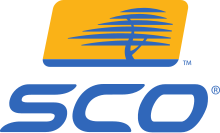 | |
 Headquarters office in Lindon, Utah, featuring the new SCO logo, pictured in December 2002 | |
| Company type | Public |
|---|---|
| Nasdaq: SCOX (later pink sheets as SCOXQ.PK) | |
| Industry | Computer software |
| Founded | 2002 |
| Defunct | 2012 |
| Fate |
|
| Successor | UnXis/Xinuos |
| Headquarters | , United States |
Number of locations |
|
Key people |
|
| Products |
|
| Revenue |
|
| |
Number of employees |
|
| Website | www |
The SCO Group (often referred to SCO and later called The TSG Group) was an American software company in existence from 2002 to 2012 that became known for owning Unix operating system assets that had belonged to the Santa Cruz Operation (the original SCO), including the UnixWare and OpenServer technologies, and then, under CEO Darl McBride, pursuing a series of high-profile legal battles known as the SCO–Linux controversies.
The SCO Group began in 2002 with a renaming of Caldera International, accompanied by McBride becoming CEO and a major change in business strategy and direction. The SCO brand was re-emphasized, and new releases of UnixWare and OpenServer came out. The company also attempted some initiatives in the e-commerce space with the SCOBiz and SCOx programs. In 2003, the SCO Group claimed that the increasingly popular free Linux operating system contained substantial amounts of Unix code that IBM had improperly put there. The SCOsource division was created to monetize the company's intellectual property by selling Unix license rights to use Linux. The SCO v. IBM lawsuit was filed, asking for billion-dollar damages and setting off one of the top technology battles in the history of the industry. By a year later, four additional lawsuits had been filed involving the company.
Reaction to SCO's actions from the free and open-source software community was intensely negative, and the general IT industry was not enamored of the actions either. SCO soon became, as Businessweek headlined, "The Most Hated Company in Tech". SCO Group stock rose rapidly during 2003, but then SCOsource revenue became erratic and the stock began a long fall. Despite the industry's attention to the lawsuits, SCO continued to maintain a product focus as well, putting out a major new release of OpenServer that incorporated the UnixWare kernel inside it. SCO also made a major push in the burgeoning smartphones space, launching the Me Inc. platform for mobility services. But despite these actions, the company steadily lost money and shrank in size.
In 2007, SCO suffered a major adverse ruling in the SCO v. Novell case that rejected SCO's claim of ownership of Unix-related copyrights and undermined much of the rest of its legal position. The company filed for Chapter 11 bankruptcy protection soon after and attempted to continue operations. Its mobility and Unix software assets were sold off in 2011, to McBride and UnXis respectively. Renamed to The TSG Group, the company converted to Chapter 7 bankruptcy in 2012. A portion of the SCO v. IBM case continued on until 2021, when a settlement was reached for a tiny fraction of what SCO had initially sued for.